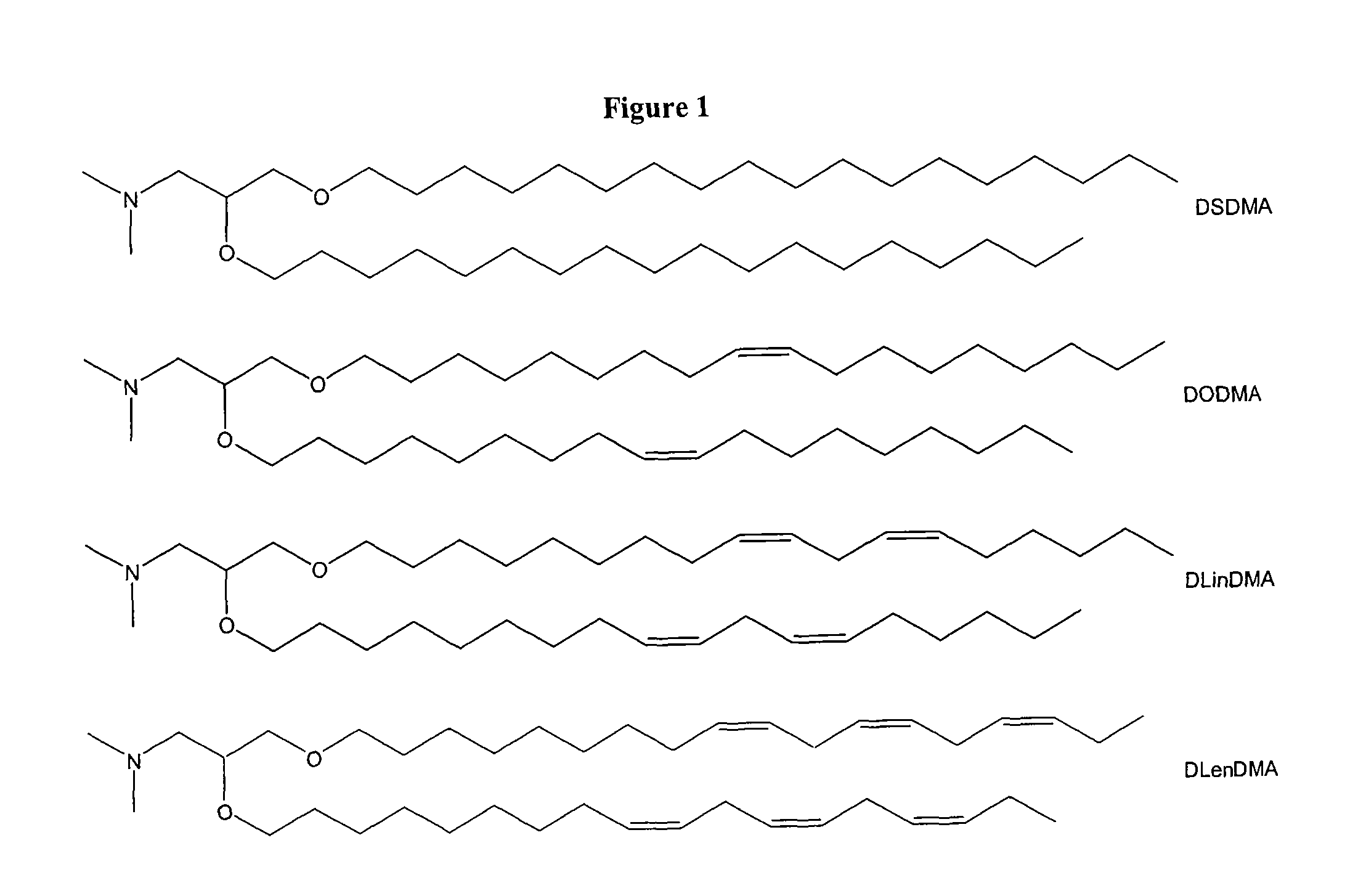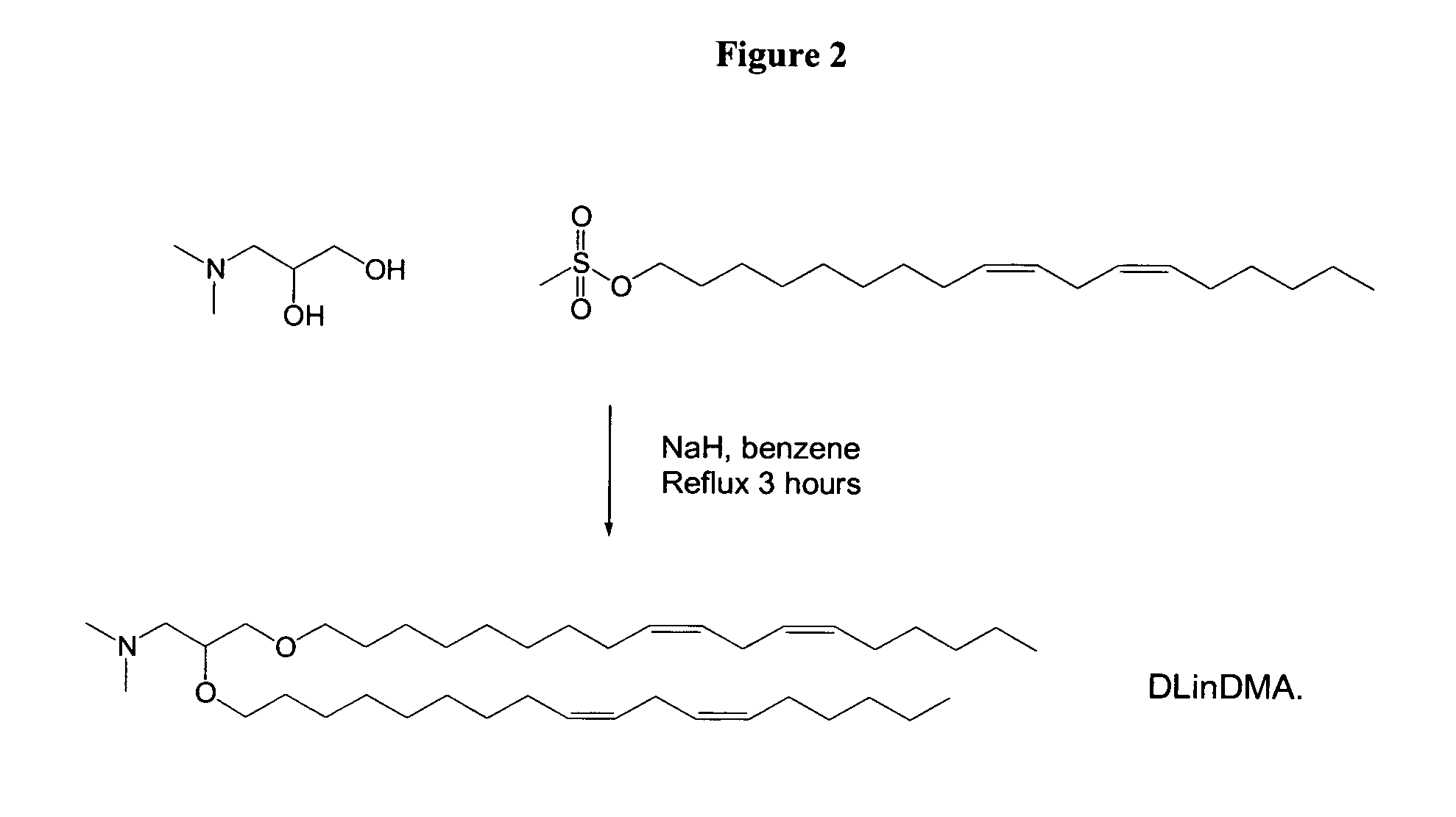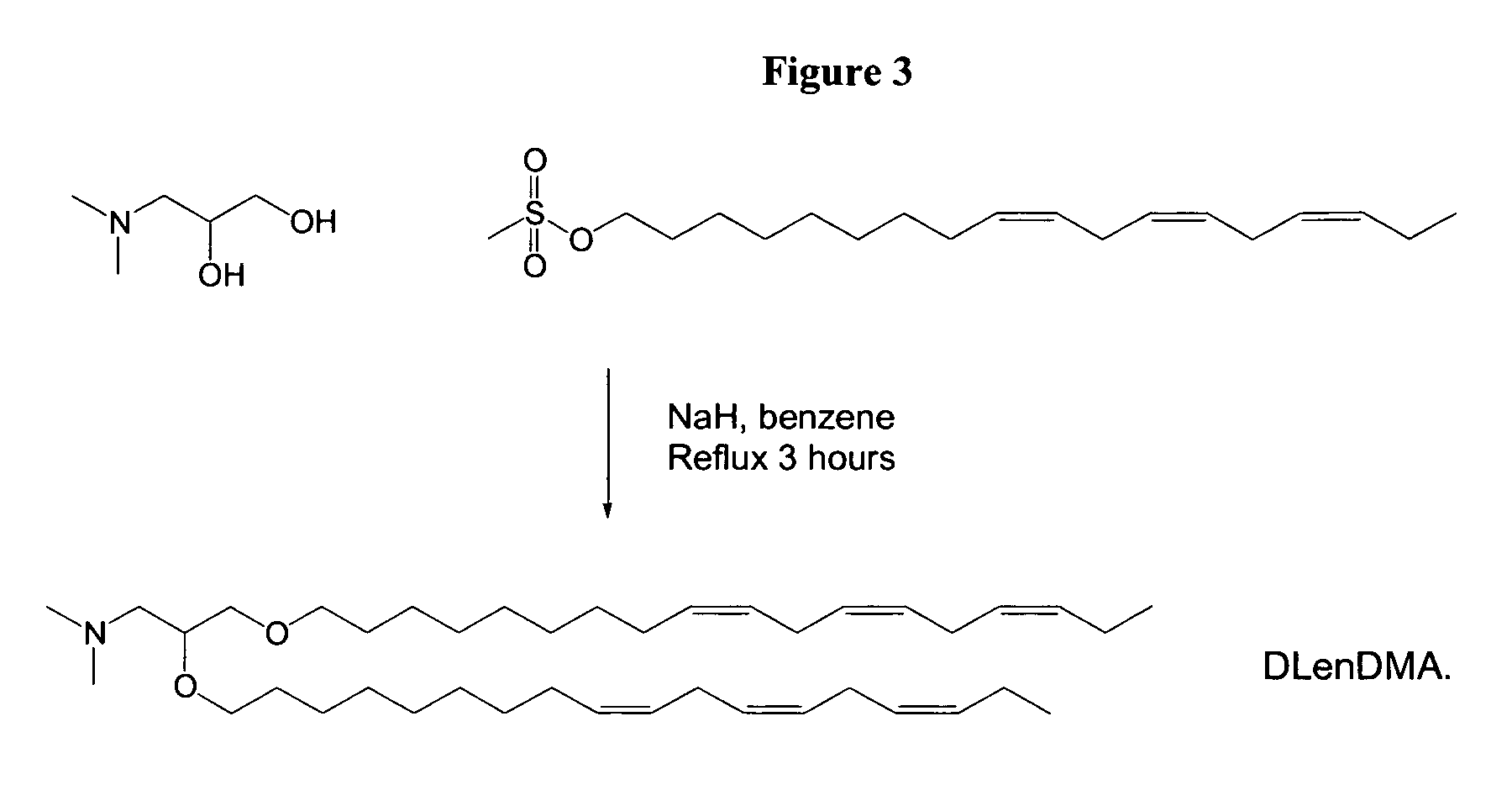Cationic lipids and methods of use
a cationic lipid and lipid technology, applied in the field of cationic lipids and methods of use, can solve the problems of large complex, large potential for reversion, and varied limitations, and achieve the effects of increasing the fluidity of the membrane of the liposome or splp, enhancing the properties of the liposome, and increasing flexibility
- Summary
- Abstract
- Description
- Claims
- Application Information
AI Technical Summary
Benefits of technology
Problems solved by technology
Method used
Image
Examples
example 1
Materials and Methods
[0233]Materials: DPPS, 1,2-Distearoyl-sn-glycero-3-phosphocholine (DSPC) and cholesterol were purchased from Avanti Polar Lipids (Alabaster, Ala.). TNS was obtained from Sigma-Aldrich Canada (Oakville, ON). RiboGreen was obtained from Molecular Probes (Eugene, Oreg.). The alkyl mesylates were purchased from Nu-Chek Prep, Inc. (Elysian, Minn., USA). siRNA (anti-luciferase and mismatch control) was purchased from Dharmacon (Lafayette, Colo., USA). The anti-luciferase sense sequence was 5′-GAUUAUGUCCGGUUAUGUAUU-3′ (SEQ ID NO:1). The anti-luciferase antisense sequence was 5′-UACAUAACCGGACAUAAUCUU-3′ (SEQ ID NO:2). All other chemicals were purchased from Sigma-Aldrich (Oakville, ON, Canada).
[0234]Synthesis of DSDMA and DODMA: DSDMA and DODMA were synthesized using the respective alkyl bromides with methodology derived from that of a DOTMA precursor (Felgner et al, PNAS USA, 84, 7413-7417 (1987)). 3-(Dimethylamino)-1,2-propanediol (714 mg, 6 mmol) and 95% sodium hydri...
example 2
Assays for Serum Stability
[0244]Lipid / nucleic acid particles formulated according to the above noted techniques can be assayed for serum stability by a variety of methods.
[0245]For instance, in a typical DNase 1 digestion, 1 μg of DNA encapsulated in the particle of interest is incubated in a total volume of 100 μL of 5 mM HEPES, 150 mM NaCl, 10.0 mM MgCl2 pH 7.4. DNase treated samples are treated with either 100 or 10 U of DNase I (Gibco-BRL). 1.0% Triton X-100 can be added in control experiments to ensure that lipid formulations are not directly inactivating the enzyme. Samples are incubated at 37° C. for 30 min after which time the DNA is isolated by addition of 500 μL of DNAZOL followed by 1.0 mL of ethanol. The samples are centrifuged for 30 min at 15,000 rpm in a tabletop microfuge. The supernatant is decanted and the resulting DNA pellet is washed twice with 80% ethanol and dried. This DNA is resuspended in 30 μL of TE buffer. 20 μL of this sample is loaded on a 1.0% agarose ...
example 3
Synthesis of 1,2-DiLinoleyloxy-N,N-dimethylaminopropane (DLinDMA) and 1,2-Dilinolenyloxy-N,N-dimethylaminopropane (DLenDMA)
[0248]3-(Dimethylamino)-1,2-propanediol (714 mg, 6 mmol) and 95% sodium hydride (NaH, 1.26 g, 50 mmol) are stirred in benzene (30 mL) under nitrogen for 30 minutes. Linoleyl mesylate (5.0 g, 15 mmol) is added and the reaction refluxed under nitrogen for 3 hours. The reaction mixture is then cooled in an ice bath while quenching via the slow addition of ethanol. Following dilution with a further 150 mL of benzene, the mixture is washed with distilled water (2×150 mL) and brine (150 mL). The organic phase is dried over magnesium sulphate and evaporated to give the crude product. The crude product is purified on a silica gel (Kiesel Gel 60) column eluted with 0-5% methanol in chloroform. Column fractions are analyzed by thin layer chromatography (TLC) (silica gel, chloroform / methanol 9:1 v / v, visualized with molybdate dip) and fractions containing purified product ...
PUM
| Property | Measurement | Unit |
|---|---|---|
| diameter | aaaaa | aaaaa |
| mean diameter | aaaaa | aaaaa |
| mean diameter | aaaaa | aaaaa |
Abstract
Description
Claims
Application Information
 Login to View More
Login to View More - R&D
- Intellectual Property
- Life Sciences
- Materials
- Tech Scout
- Unparalleled Data Quality
- Higher Quality Content
- 60% Fewer Hallucinations
Browse by: Latest US Patents, China's latest patents, Technical Efficacy Thesaurus, Application Domain, Technology Topic, Popular Technical Reports.
© 2025 PatSnap. All rights reserved.Legal|Privacy policy|Modern Slavery Act Transparency Statement|Sitemap|About US| Contact US: help@patsnap.com



